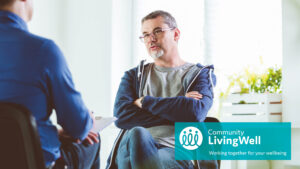Peer Support: Alain’s Story
 A couple of years ago, Alain experienced a traumatic health scare which led to anxiety, panic attacks and eventually, severe depression.
A couple of years ago, Alain experienced a traumatic health scare which led to anxiety, panic attacks and eventually, severe depression.
He lost his confidence, stopped doing the things he enjoyed, and distanced himself from friends and family. A friend recommended he try peer support. Alain shared his story with us and explained how peer support is helping his recovery.
How did you first hear about Peer Support? Could you tell us a little bit about what you were going through which led you to seek support?
About two years ago, I had a very traumatic operation. It was an emergency operation, I had sepsis, and it was at the height of the pandemic. I ended up suffering a lot of very traumatic post-op difficulties. I started having anxiety on a level I have never experienced; I had panic attacks, I stopped going out. It quickly led to depression, and as the time passed it became very severe. I kept myself from friends, all the things you shouldn’t do, but I didn’t realise that at the time.
I had reached a point where I could no longer connect with people, even with close friends. I was locked in my head. It was absolutely incredible. And physically it had a great impact as well. I found walking difficult, I was always dizzy, I had panic attacks. It was a terrible time. A friend had told me about Kensington & Chelsea Mind, so I got in touch. Initially, I tried going to the social gathering they have at the beautiful church in Ladbroke Grove, but I was still in a terrible place. I felt absolutely overwhelmed and distressed by the fact that I couldn’t connect. I couldn’t open up, I wasn’t even listening!
Then I got a call from one of the peer support workers. He’s not a counsellor, although he has extremely good counselling skills. For the first time, I met somebody who was willing to talk about their own experience. He was sharing stuff about himself that I could relate to, and this had a great impact on my recovery. We had weekly conversations, sometimes online, sometimes on the phone, and it was his understanding and kindness that allowed me to open up in a way that I would not have been able to do with anyone else.
Which peer support groups do you attend and how do they help you?
I’m attending the creative arts group on a regular basis now. I find it very cathartic. I have no artistic skills, but everyone can draw or paint. It’s so good for me because there are other people like me around the table, and we don’t have to speak about our mental health. We could if we wanted, but we could speak about this or that whilst drawing, and there is no pressure. I really appreciate that, and it also helped me reconnect.
I also take part with the walking groups occasionally in Kensington Gardens and Holland Park. It has all made a hell of a difference. It’s community based, so you don’t have to travel very far. When you’re not well, the idea of travelling can be overwhelming, whereas I could walk from my place to meet the group.
You said you don’t have to talk about mental health at the sessions, but when the conversation does lead to mental health, how do you find it? Is it helpful?
Yes. After a little while and you’ve broken the ice, people start to talk about their mental health. As I got slightly better, I started to open up and tell people about my own struggles. We all have different stories, but there’s a lot I realised that is common. Some people in return would be more forthcoming.
Is it helpful then if someone mentions something that you might’ve experienced or you’ve been feeling, then you can connect on that level?
Yes, and also people have their own ways of coping and sometimes you can learn a lot from listening to other people’s stories. Or they can tell you that they got help from another organisation, they give you names of services you might never have heard of, or techniques that help them. Somebody was telling me about the creative arts group and how therapeutic it had been for them. I asked if I could join the class, and turned out that it was indeed truly beneficial, especially when you’re in a state where you’re locked in your head.
Have you seen an improvement in your situation or feelings?
Absolutely. I would say I’m well; I haven’t totally recovered. I’m very aware of the precarity of my mental health, so I tend to monitor it on a regular basis, every day.
I’ve adopted a little-step approach and set myself aims, because I would find it overwhelming. I’ve started gardening again. After the operation, all the things I loved that kept me going, suddenly I was no longer interested. I couldn’t stand to think of gardening, I couldn’t even watch gardening programmes. The love I felt for friends, it was gone! I was totally lost. It’s truly frightening. To have somebody like the peer support worker, who shared his own experience, was really important to me.
Having the regular timetable of activities also gives you a structure to your day. I found myself having nothing to do. I spent the whole day watching Netflix, just escaping or trying to escape. Every so often my mind was wandering and I was back in my head, it was terrible. So, having a bit of structure to my day, it does certainly help. You go out of the house, you have a bit of exercise.
Would you recommend Peer Support?
Oh absolutely, yes. The worst thing when it comes to depression is isolation, but you can’t help it. It’s not a matter of courage, you’re in a very dark place. You just want to hide. But by attending the peer support groups and knowing that other people are going through the same thing, it can be very helpful. You feel less alone. There’s still some stigma attached to mental health and often it’s us, the patient, who internalises this stigma and it becomes deep-rooted in our head. When I was at the height of this depression, I felt terribly ashamed. I didn’t want to go out, I didn’t want people to see my face because they could see that I was unwell, I was hiding.
What would you say to someone to encourage to try peer support if they are unsure?
I would say, start on the phone. You don’t have to leave your home. See how it goes. It might encourage you to go out and meet a peer support worker face-to-face, or attend one of the social gatherings and try that. Then when you feel more confident, perhaps join a peer support group, where you meet people that suffer from depression or anxiety, and who are struggling to get better on their own. I highly recommend it; the peer support team does fantastic work.
For more information…
If you are interested in peer support, you can refer yourself quickly and easily online.
This story was originally published in issue 12 of Community Living Well magazine. It has been edited for website purposes. You can sign-up to our mailing list to receive the magazine directly into your inbox.
Author: Stewart Gillespie
Posted on: 16th August 2023



